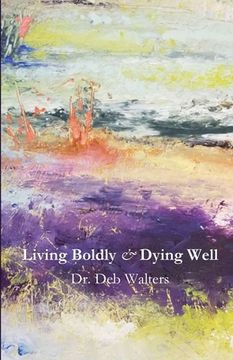Reseña del libro "Living Boldly and Dying Well (en Inglés)"
This book of encouraging a life of awareness and interconnectedness to God, Self/Soul and Others began decades ago. There is a rhythm to life's seasons. There is an opening and closing to chapters of our life that has death like experiences, grief, gratitude, and literal goodbyes that end in a funeral. How do we join in this rhythm of living, grieving, counting our blessings, and dying contributions of experiences and interactions? Why do we believe what we believe? Are we able to believe what we believe without compromising our own or insulting another's? Is what we hold dear in our values and beliefs vetted with God's Word and Spiritual Wisdom? How can we know the joy and laughter of living and ignore the pain and loss in living too? In what ways do we contribute to both sides of this wonder and wicked dispositions oozing into our spirit from external sources? Can we consider experiences from the wonder and wicked of life which inform our internal spirit of who we are from the inside out? Is there authenticity and congruency or are the masks of control, power, and faux love in shallow ways and means a survival mechanism of self-interests? Is the world a better place while we are here? Do we give more than we take? Do we love as God has loved us?When I sit with a counselee, teach a class on wholeness and spiritual wellbeing, or biblical study, I encourage the ability to sit with a variety of questions. Questions hold the most important attribute within the very word question. The answers to any question rest in that word quest, which is the invitation to a journey. The quest for answers is in the very questions we are all prepared to ask. It takes courage to find the answers we are looking deep within ourselves where the answers live. I confess I am a lifelong learner that has always investigated questions. Why do we do that? How true is that belief? If we live by our faith that sustains us; why do, we fear so much and grieve so poorly? If God is love; how are we defining love? Do I believe this or that because of my culture? What are my values and clarifications which influence those values from the effects of what is just or unjust? What is prayer and how important is it, really? Do we have freewill? If so, where in the story of us does it show up to reveal ourselves to ourselves? What does our spirituality have to do with our finances, physicality, vocation, social circles, emotions, and cultural nuances? In this journey of words, stories, scriptures, and questions you will see me use human-divine because we are both. We forget that fact is laid out by God in the early chapters of Genesis and from the work of Jesus in his ministry teachings: but we are. In this read the term use of self/soul is also used throughout this mapping a spiritual life in Christian Spirituality. The purpose is to be clear that we do not have a soul tucked away and hidden in the gut of who we are until our last breath is released and the soul floats away out of the Nephesh of our being. That is but one characteristic of the soul's eternal movement from here to there of the leaving. Nephesh is the place deep within our belly that the Hebrew word offers the many meanings of the soul's character as person, body, beast, human, lust, mind, heart, creature, self, and ghost to name but a few words to describe a soul. The self is Eh-stem phonetically in Hebrew and speaks to the self or essence as bone. The self is a total package of flesh, bone, and essence/persona. The Greeks would treat our bodies, self, and bone as separated from the soul of a person. This compartmentalization has been a large part of why psychology, religions, and spirituality have struggled for centuries around moralism and humanism to name two isms that cost the soul of us by neglecting the soul's divinity attributes of 'let us make them in our image' (Gen. 1:26).

